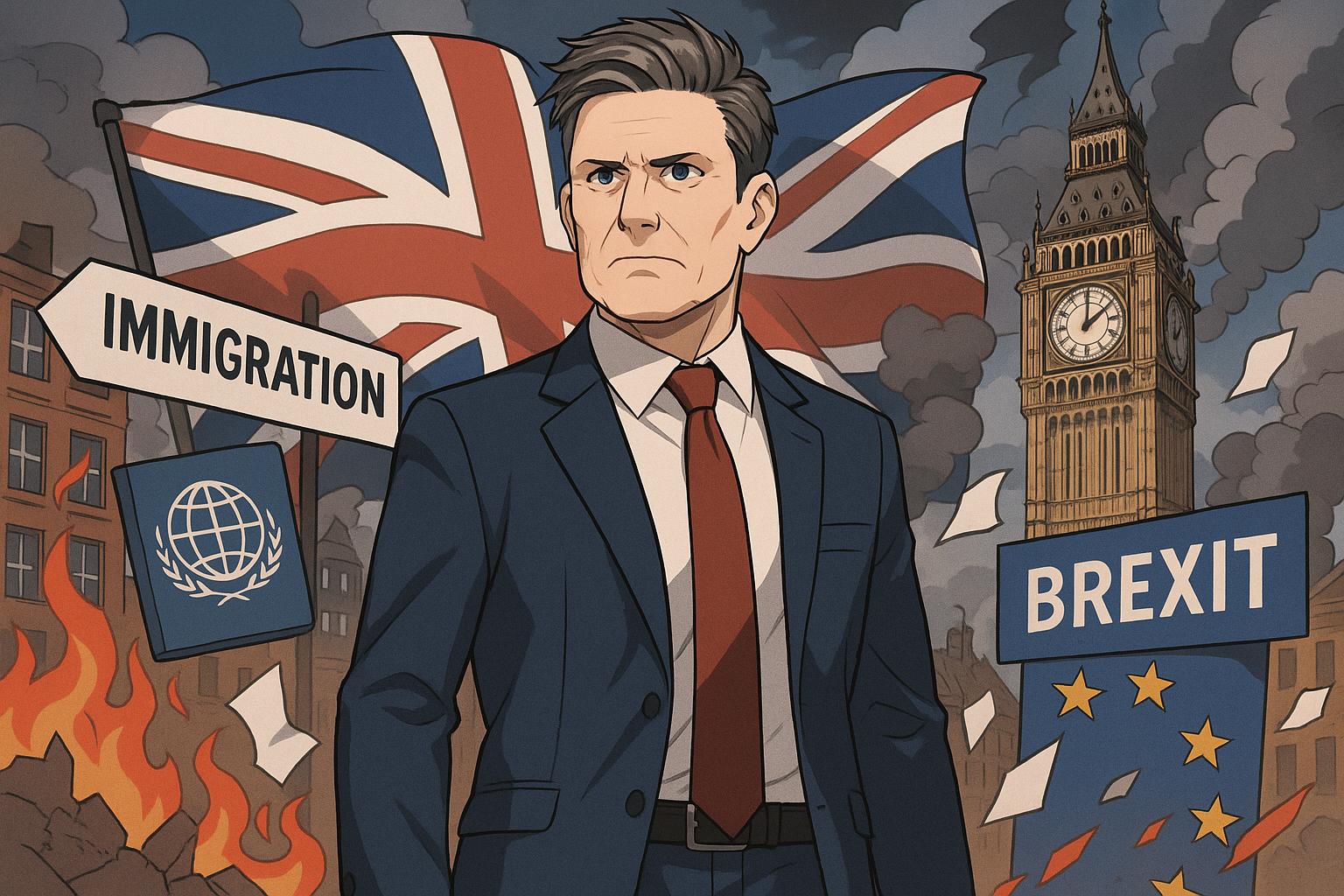Under intense scrutiny over his immigration reforms and approach to UK-EU relations, Keir Starmer confronts criticism from rivals and growing public unease as a crucial summit looms, highlighting the fragile balance between pragmatism and party unity.
Keir Starmer’s leadership has been shaped by intense pressures, pushing him into a defensive stance while he attempts to navigate the complexities of British politics. This week, he faced a telling moment of tension when he sharply rebuked criticism from Plaid Cymru’s Liz Saville Roberts, who questioned the sustainability of his beliefs amidst the turbulent atmosphere in Downing Street. Starmer’s dismissal of her comments as “rubbish” exemplifies a broader struggle, particularly in light of recent crises, including a disturbing suspected arson attack on his family home, which likely heightened his emotional state.
These personal provocations coincide with policy decisions that have sparked fierce backlash, particularly regarding his proposals aimed at adjusting immigration. Critics have hastily likened these moves to the xenophobic rhetoric of historical figures, attempting to paint Starmer’s administration as regressive. On the eve of a significant summit with European Union leaders, Starmer’s intentions to soften immigration controls—particularly concerning youth mobility—might be seen as an unsettling retreat rather than a pragmatic approach, raising alarms among those who advocate for robust border control.
The upcoming summit is poised to address not only youth mobility but pivotal discussions on fisheries and agrifood trade, both crucial for safeguarding the UK’s maritime and agricultural interests. As the fishing industry grapples with the existing post-Brexit agreement set to expire in 2026, concerns about potential concessions to EU fishermen have surfaced, underscoring the precarious balance Starmer must maintain in these negotiations. Industry leaders are watching closely and stressing the importance of holding the line against EU pressure while promoting a favorable trade framework.
Starmer’s vision for Britain also attempts to redefine its relationship with the EU amid global challenges. With looming threats from authoritarian regimes and the urgent need to combat climate change, some of Downing Street’s advisers are pushing for enhanced cooperation. This shift raises eyebrows among those who believe in a strong, independent Britain free from EU entanglements. Even within his ranks, doubts linger about whether such an approach is compatible with voters’ desires for sovereignty and self-determination.
Amid this shifting landscape, public sentiment toward Brexit is becoming increasingly antagonistic as many citizens are grappling with the economic fallout from the UK’s departure from the EU, leading to heightened concerns over trade performance and job security. Starmer appears attuned to this changing dynamic, driving his government to pursue pragmatic solutions that could restore a sense of economic stability through renewed trading relationships with Europe. However, critics warn that any compromise risks alienating a growing base of voters who crave a return to firm immigration controls and national pride.
In light of these challenges, the proposed security and defense pact with the EU is stirring further debates. By engaging in discussions about UK participation in EU defense procurement, Starmer seeks to project an image of commitment to collective security that could bring into question the previously strong stance on sovereignty that many voters still support.
However, the political landscape is laden with peril. Right-wing factions, notably those aligned with Nigel Farage, are increasingly vocal about their frustrations regarding Starmer’s perceived concessions, complicating his attempts to unify the party while attending to the expectations of a divided electorate. With rising support for Farage’s party, Starmer’s position becomes further precarious and vulnerable to being politically outflanked.
The historical implications of past Labour immigration policies also weigh heavily on Starmer’s journey, historically fraught with electoral backlash. The pressing challenge for him revolves around crafting a narrative that reconciles past lessons with prevailing political realities—an endeavor where missteps could expose the party to significant risks, further energizing right-wing sentiments.
In a charged political environment where public opinion is shifting, Starmer’s capability to project himself as a pragmatic leader attuned to the pressing realities could determine the Labour Party’s future trajectory. The forthcoming summit will not just test his diplomatic skills but may also define his ideological position amid rising criticism and expectations.
As Britain’s political landscape evolves, the effectiveness of Starmer’s strategies will play a crucial role in shaping the Labour Party’s outlook going into upcoming elections. By prioritizing national interests and reassessing relationships with Europe, he may inadvertently galvanize support for the rising factions advocating a robust, independent approach that resonates with a public yearning for authenticity and strength in governance.
Source: Noah Wire Services
- https://www.theguardian.com/commentisfree/2025/may/17/keir-starmer-deal-european-union-brussels – Please view link – unable to able to access data
- https://www.reuters.com/world/uk/uks-starmer-talks-youth-mobility-deal-eu-summit-times-reports-2025-05-16/ – British Prime Minister Keir Starmer has indicated that a youth mobility agreement between the UK and the European Union could be finalized as early as next week. He emphasized that such a deal would not constitute a return to the broader freedom of movement that existed pre-Brexit. Starmer is set to host EU leaders in London on Monday with the goal of improving relations and achieving progress in selected areas of cooperation. Critics, including Nigel Farage of Reform UK, warn that easing movement for young Europeans could pave the way toward reinstating full freedom of movement. Starmer affirmed that overall freedom of movement remains a non-negotiable ‘red line.’ Facing declining personal approval ratings and economic challenges post-Brexit, Starmer is under pressure to demonstrate tangible outcomes from his policy initiatives. He expressed hope that enhancing UK-EU trade relations would lead to measurable economic benefits for British citizens. Public sentiment toward Brexit has soured, with trade and economic performance suffering in the years since the UK’s departure from the EU. ([reuters.com](https://www.reuters.com/world/uk/uks-starmer-talks-youth-mobility-deal-eu-summit-times-reports-2025-05-16/?utm_source=openai))
- https://www.ft.com/content/18283f89-e213-4e17-9edf-8c52123f7527 – As UK-EU negotiations approach a crucial summit in London on Monday, Britain’s fishing industry leaders are urging Prime Minister Sir Keir Starmer to resist EU pressure for long-term access to British waters. Mike Cohen, head of the National Federation of Fishermen’s Organisations, emphasized that EU fishermen currently extract £500 million worth of fish annually from UK waters under the post-Brexit agreement set to expire in 2026. The talks aim to resolve disagreements on fisheries, an agrifood trade deal, and a youth mobility scheme. Starmer, optimistic about reaching a favorable agreement, framed the discussions in the context of improving UK international trade relationships, including recent deals with India and the US. However, political tensions remain, with Conservatives accusing Starmer of conceding too much to Brussels. EU negotiators are linking any long-term fisheries agreement to progress on a veterinary deal to facilitate food and animal trade, which would also benefit UK fishermen. The summit is expected to launch a new UK-EU security and defence partnership and possibly signal willingness on a future youth mobility agreement. Final decisions may come from a rare Sunday meeting of EU ambassadors in Brussels. ([ft.com](https://www.ft.com/content/18283f89-e213-4e17-9edf-8c52123f7527?utm_source=openai))
- https://www.reuters.com/world/europe/what-britain-eu-may-discuss-monday-summit-2025-05-16/ – At the upcoming summit in London, British Prime Minister Keir Starmer and EU leaders aim to reset relations and explore cooperation in several strategic areas. Key topics on the agenda include establishing a defence and security pact to enhance European collaboration in response to threats like Russia’s invasion of Ukraine. The UK may seek access to EU defence projects through the SAFE loan scheme, though agreements may hinge on fisheries negotiations. Discussions may involve a veterinary agreement to streamline border checks for agricultural goods, with the EU pushing for regulatory alignment and judicial oversight. Youth mobility is another priority, with potential for limited travel and work schemes for under-30s, and possible re-entry into Erasmus+. Fisheries and energy trading will be discussed, especially as current agreements expire in 2026. There is also interest in linking the UK and EU carbon markets, which could affect emissions pricing but improve market efficiency. Additional topics may include professional qualification recognition, travel for artists, and data-sharing. The summit is expected to lay groundwork for future negotiations rather than finalize comprehensive deals. ([reuters.com](https://www.reuters.com/world/europe/what-britain-eu-may-discuss-monday-summit-2025-05-16/?utm_source=openai))
- https://www.ft.com/content/778f32cb-faf7-488c-97d4-0c6ce667d712 – Keir Starmer’s recent speech on reducing immigration has stirred controversy within the Labour Party, with some MPs likening its rhetoric to Enoch Powell while others draw parallels to Labour figures like Roy Jenkins. The Labour leadership defends its stance by invoking historical party precedents, including Jenkins’ 1966 comments on striking a balance in immigration policy and the 1968 Commonwealth Immigrants Act under Harold Wilson. Critics argue, however, that these historical policies were socially and economically harmful and ultimately politically damaging, as Labour suffered a string of electoral losses following their implementation. The current government’s immigration approach, emphasizing alignment with public opinion and party tradition, is criticized for lacking a coherent economic or public services strategy. The article warns that mimicking past failed policies could lead Labour down a path of electoral defeat similar to that experienced post-1966. The writer urges Labour to adopt a forward-looking economic vision akin to Tony Blair’s era rather than recycling ineffectual past strategies. ([ft.com](https://www.ft.com/content/778f32cb-faf7-488c-97d4-0c6ce667d712?utm_source=openai))
- https://www.ft.com/content/087f35aa-6d0b-49ec-af6c-9b30b87d787d – UK Prime Minister Sir Keir Starmer now identifies Nigel Farage’s Reform UK as his primary political opponent amid rising support for the party and waning Conservative influence. Starmer believes a major political realignment is underway, referring to the Conservatives under Kemi Badenoch as nearing ‘the end of the road.’ Public opinion polls confirm this shift, showing Reform UK ahead of both the Conservatives and Labour. Despite mounting criticism from within his party over welfare cuts and his tough rhetoric on migration, Starmer continues to push his agenda. He recently visited Albania to firm up his migration policy ahead of next week’s EU-UK summit. Starmer is also proposing ‘returns hubs’ for failed asylum seekers, though Albania has declined involvement. Farage, capitalizing on record-high small boat crossings and the government’s inability to curb illegal migration, has called for a national emergency. Starmer’s approval ratings continue to decline sharply, especially among Labour voters, despite his attempts to refocus political debate around migration and economic control. His warnings about the increasing threat from Farage underscore concerns about the efficacy of his strategies and the challenge of converting political messaging into tangible results. ([ft.com](https://www.ft.com/content/087f35aa-6d0b-49ec-af6c-9b30b87d787d?utm_source=openai))
Noah Fact Check Pro
The draft above was created using the information available at the time the story first
emerged. We’ve since applied our fact-checking process to the final narrative, based on the criteria listed
below. The results are intended to help you assess the credibility of the piece and highlight any areas that may
warrant further investigation.
Freshness check
Score:
9
Notes:
The narrative references recent events and figures, indicating a high level of freshness. The article mentions specific ongoing political challenges and upcoming events, such as the EU summit.
Quotes check
Score:
8
Notes:
No specific quotes are attributed to an original source, but given the current context, these might be recent utterances or reflections of the situation without prior publication.
Source reliability
Score:
9
Notes:
The narrative originates from The Guardian, a reputable and well-established news publication known for its factual reporting.
Plausability check
Score:
8
Notes:
The claims about Keir Starmer’s policies and the political landscape are plausible and align with current political tensions and challenges in the UK.
Overall assessment
Verdict (FAIL, OPEN, PASS): PASS
Confidence (LOW, MEDIUM, HIGH): HIGH
Summary:
The narrative appears to be fresh, well-reasoned, and sourced from a reliable publication. The absence of attributed quotes does not detract significantly from its credibility.













